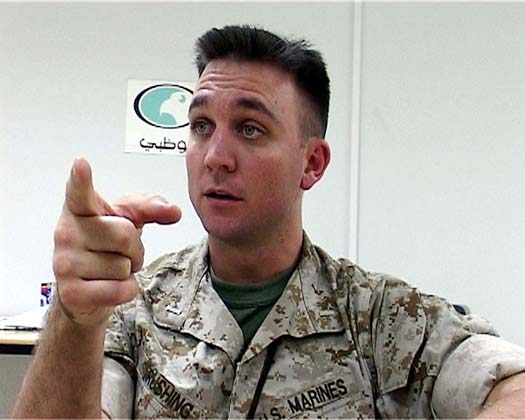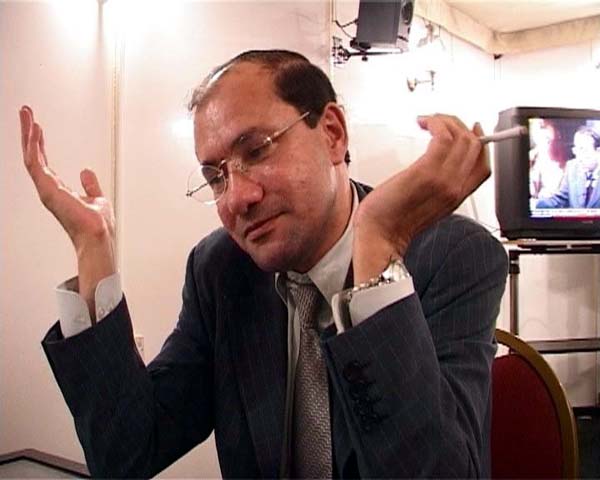

Most Americans first heard of Al-Jazeera was shortly after the war in Afghanistan. It is currently the most watched station in the Middle East. Bush administration officials, particularly Secretary of Defense Donald Rumsfeld, vilified the Arab news channel for allegedly taking sides against the United States by airing Al Queda propaganda and staging news scenes. Meanwhile, unbeknownst to most Americans, Arab countries banned Al-Jazeera for airing stories that portrayed their governments in an unflattering light. Control Room is a fascinating documentary that follows various people from the only all news station in the Middle East in the aftermath of the war in Afghanistan and through the war with Iraq. What is immediately clear is that Al Jazeera is not biased for or against the United States, and not biased for or against other Arab nations. If anything, it is a little too sensationalistic.
MSNBC journalist David Shuster explained it perfectly. The US has over two hundred years of freedom of the press. There is no history of journalistic independence in the Middle East. There are very few democracies, and freedom of the press is a joke. Al Jazeera, based in Doha, Qatar, is the only station of its kind, and its presence alone is enough to rile the feathers of various countries unused to anything remotely critical. Although many of the journalists and executives at Al-Jazeera have BBC training, many other reporters do not seem to. While senior producer Samir Khader comes across as extremely intelligent and levelheaded, some of other, less seasoned journalists come off as much less professional. One segment has an Al-Jazeera journalist arguing with an American analyst about his combativeness in interviews. He fails to distance himself from the story. He asks the analyst how he can be calm when his people are dying. It's an interesting question that another Al-Jazeera journalist poses during an ABC interviewer. She answers a question about objectivity during war with another question, how can anyone be objective during war?
Part of the issue is context. Director Jehane Noujaim (Startup.com, Down From the Mountain) presents a varied picture of the station from three main perspectives. The American perspective comes from Lt. Josh Rushing, a Marine whose main responsibility is press. Rushing understands that Americans view the world very differently than Arabs, and one of his goals is to somehow reconcile these viewpoints. He is frustrated at his own actions and sometimes unintentional spin. Rushing is earnest, smart, and always willing to engage in dialogue. Khader is by far the anchor of the film. He states that if offered a position with FOX, he would immediately take it. Khader is a dreamer, striving earnestly for freedom of the press. He believes fervently in what he is doing, and his frustration with some events is obvious. Noujaim goes out of her way to show that Al-Jazeera does have some limits. At one point Khader berates a producer for booking a nut job who claimed to be an American analyst. Khader was angry because he wanted a learned, neutral analysis of the situation in Iraq. The opinion that this man had was fine in an op-ed piece, but had no place in a news context. And there is a fascinating dissection by Khader of the men seen toppling the statue of Saddam Hussein.
The last character is reporter Hassan Ibrahim. He is the most enjoyable because of his ability to talk in sound bytes. He comments sometimes border on the sarcastic, and he is really funny. Unfortunately, his penchant for smart-alecking detracts from some of his more thoughtful comments. Ibrahim and Khader deny that Al-Jazeera is biased. They say that it is important to show things like Arabs injured in American air strikes because it shows the effects of war. As Control Room mentions, at worst, Al-Jazeera is patriotic towards Arabs the same way that Fox News is patriotic towards Americans. Noujaim portrays most of the journalists in Control Room in a pretty good light. She shows their obvious annoyance at some of the policies of the military that seem to stymie the flow of information. They are a tight-knit bunch that sticks together. And it is important to note that the Al-Jazeera journalists are just as professional as the American ones. Basically, Al-Jazeera is like a toddler. It is still young, and extremely curious. It is taking small baby steps into the world, trying all it can to learn things correctly, making some mistakes along the way.